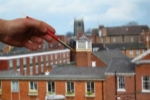
高中英语作文翻译题目练习【一】
1. Nancy is too young to dress herself.
Nancy is not _____ _____ to dress herself.
2. My watch doesn't work well.
There is ____ _____ _______ my watch.
3. Jane doesn't go to work by bus any longer.
Jane ____ _____ _____ to work by bus.
4. It took Mary two weeks to prepare for the exam.
Mary _____two weeks____ ______ for the exam.
5. It seems that they have known each other.
They seem to _____ _____ each other.
6. "My grandpa doesn't like coffee or coke" said Bob
Bob said that _____grandpa liked _____coffee _____coke.
7. Cao Fei joined the League three years ago.
Cao Fei _____ ____ _____ the League for three years.
8. I prefer walking there to going by bus.
I prefer to walk there ____ _____ going by bus.
9. -Thank you very much. -You're welcome.
- ____ a lot. -Not at____ .
10. Kitty does well in English.
Kitty ____ ____ ____ English.
11. They realized Hainan was a beautiful place after they reached there.
They____ realize Hainan was a beautiful place_____ they reached there.
12. We will have to finish the work hardly if you don't help us. We can't finish the work _____ _____ ______
13. My dictionary isn't so thick as yours.
My dictionary is _____ than yours.
14. Could you tell me where the East Street Hospital is? Excuse me, ____ is the _____ to the East Street Hospital?
15. The book is exciting to read.
It is ____ _____ read the book.
16. Jack's mother asked him, "Have you packed your things?" Jack's mother asked him ____ he ____ packed his things.
17. She likes singing better than dancing. She ____ singing ____ dancing.
18. Remember to ring me up as soon as you get to Nanjing Make ____ to give me a ring as soon as you _____ Nanjing.
19. They couldn't catch the train because of the heavy traffic. The heital?
15. The book is exciting to read.
It is ____ _____ read the book.
16. Jack's mother asked him, "Have you packed your things?" Jack's mother asked him ____ he ____ packed his things.
17. She likes singing better than dancing. She ____ singing ____ dancing.
18. Remember to ring me up as soon as you get to Nanjing Make ____ to give me a ring as soon as you _____ Nanjing.
19. They couldn't catch the train because of the heavy traffic. The heavy traffic _____ them from _____ the train.
20. My brother has been away from home for two days.
My brother _____ home two days _____ .
21. Li Lei decided to move to Canada when he was thirty.
Li Lei made a _____ to move to Canada at the _____ of thirty.
22. Jim was too careless to pass the exam last term.
Jim was not_____ _____ to pass the exam last term.
23. If you don't hurry up, you can't catch the train.
Hurry up, _____ you may _____ the train.
24. Yang Li wei said to us, "I'm going to visit your school tomorrow. " We were all pleased.
We were all pleased when we heard Yang Li wei_____ visit_____ school the next day.
25. This is the most interesting film I have ever seen. I have ____seen _____ an interesting film before.
26. I was late for school because of the traffic accident. The traffic accident _____ me _____ getting to school on time.
高中英语作文翻译题目练习【二】
??年级英语暑假改写句子的练习题1. It is fun at school.
改成否定句__________________________________________
改成一般疑问句______________________________________
肯定回答_____________________________________________
否定回答_____________________________________________
2.I like grapes.
改成否定句__________________________________________
改成一般疑问句______________________________________
肯定回答_____________________________________________
否定回答_____________________________________________
3. Miss Green is a good English teacher.
改成否定句__________________________________________
改成一般疑问句______________________________________
肯定回答_____________________________________________
否定回答_____________________________________________
4. Norman likes maths.
改成否定句__________________________________________
改成一般疑问句______________________________________
肯定回答_____________________________________________
否定回答_____________________________________________
5. Jim is watching TV.
改成否定句__________________________________________
改成一般疑问句______________________________________
肯定回答_____________________________________________
否定回答_____________________________________________
6.There are so many animals.
改成否定句__________________________________________
改成一般疑问句______________________________________
肯定回答_____________________________________________
否定回答_____________________________________________
7.I can hear something in the next room.
改成否定句__________________________________________
改成一般疑问句______________________________________
肯定回答_____________________________________________
否定回答_____________________________________________
8. I’ve got the letter“n”.
改成否定句__________________________________________
改成一般疑问句______________________________________
肯定回答_____________________________________________
否定回答_____________________________________________
9. MMike has got a picture of Shanghai.
改成否定句__________________________________________
改成一般疑问句______________________________________
肯定回答_____________________________________________
否定回答_____________________________________________
10.There’s a big playroom in our school.
改成否定句__________________________________________
改成一般疑问句______________________________________
肯定回答_____________________________________________
否定回答_____________________________________________
11. They have got some bananas.
改成否定句__________________________________________
改成一般疑问句______________________________________
肯定回答_____________________________________________
否定回答_____________________________________________
12. Tom and Jim are watching a match.
改成否定句__________________________________________
改成一般疑问句______________________________________
肯定回答_____________________________________________
否定回答_____________________________________________
13. I want some carnations for my mother.
改成否定句__________________________________________
改成一般疑问句______________________________________
肯定回答_____________________________________________
否定回答_____________________________________________
14. Those are roses.
改成否定句__________________________________________
改成一般疑问句______________________________________
肯定回答_____________________________________________
否定回答_____________________________________________
高中英语作文翻译题目练习【三】
2. Many schools demand the students wear uniforms. Some people think that such a practice can undermine their personality and individuality. What is your opinion?
3. Some people believe that pet animals such as cats and dogs cannot be kept in the cities, especially in busy modern cities. Do you agree or disagree?
4. Nowadays, teenagers cause a lot of social problems due to lack of discipline. Some people think that parents should spend more time staying with their children. Do you agree or disagree?
5. Nowadays, many children have their part-time jobs. Some people say that doing part-time jobs is useful, but others argue that children should enjoy their childhood. Discuss both sides and give your own opinion.
6. Some people think if students want to learn a foreign language, it is advisable for them to learn it in the native countries where the language is actually spoken. Whats your opinion? Give your reasons.
7. In some countries, there are women taking the positions of police officers, while some people believe that women are not suitable to work in the police force. DO you agree or disagree? Write your reasons and give examples in your experience.
高中英语作文翻译题目练习【四】
(一)改写一般疑问句:
(1)原句中有be动词的,将be动词提前,其他顺序不变。
例如:Thisisacat.变为Isthisacat?
(2)原句中有情态动词的(can/may/shall/would)将情态动词提前,其他顺序不变。例如:Hewouldlikeapie.变为Wouldhelikeapie?
(3)原句中是一般动词的,在句首加助动词do或dose(用于主语是第三人称动词单数的句子),其他顺序不变。例如:Iplaytheguitar.变为Doyouplaytheguitar.
(4)原句中的some变any。
注:以情态动词开头的一般疑问句,并且要求对方做肯定回答的`some不变。
(5)原句中的第一人称改为第二人称。例如:Iamanurse.变为Areyouanurse?
(6)以dose开头的一般疑问句,原来动词的第三人称单数形式要变回原形。例如:Hereadsastorybook.变为Dosehereadastorybook?
(二)改写否定句:
(1)原句中有be动词的,直接在be动词后面加not。例如:Itisadog.→It’snotadog./Itisn’tadog.
(2)原句中有情态动词的,直接在情态动词后加not。
例如:Iwouldlikeahotdog.→Iwouldnotlikeahotdog.
(3)原句中是一般动词的,在一般动词前加don’t或doesn’t(用于主语是第三人称单数的句子),doesn’t后面用原型。例如:Iseethreehamburgers.→Idon’tseethreehamburgers.
原句中的some变any例如:Ihavesomebreadan
dmilk.→Idon’thaveanybreadandmilk.
(4)以let开头的祈使句,如果是letus或letme,直接在其后加not;如果let后面其他人称代词宾格(you、him、her、them、it)就在let后面加助动词don’t。例如:Letusgotothepark.→Letusnotgotothepark.再如:Letthemdohomework.→Don’tletthemdohomework.
(三)对划线部分提问:
对划线部分提问,就是先把一个陈述句的划线部分去掉,然后变为一个特殊疑问句:一是特殊疑问句+一般疑问句;
二是特殊疑问句+陈述句(对主语或主语的定语提问,therebe结构除外)
⑴划线部分是人,用who提问。
⑴划线部分是主语,用who提问,who后面的动词要用第三人称单数形式。如:Whois;Wholikes;Whohas?
方法:who+原句的剩余部分
例如:①HelenandMikearelisteningtomusic.
→Whoislisteningtomusic?
②Ihavesomemodelplanes.
→Whohasanymodelplanes?
⑵划线部分是表语,用who提问。
方法:Who+剩余部分的一般疑问句形式
⑵划线部分是事或者物,用what提问。
方法:what+剩余部分的一般疑问句形式。
注:如果原句是therebe句型,直接用What’s+地点状语来提问。例如:①Wewouldliketobuysomethingsforaparty.
→Whatwouldyouliketobuyforaparty?
②Therearealotofcakesintheplate.
→Whatisintheplate?
⑶划线部分是物主代词或名词所有格,用Whose提问。
方法:⑴划线部分是主语的定语时,Whose+剩余部分
例如:Ourclassroomisbright.
→Whoseclassroomisbright?
⑵划线部分是表语或表语的定语时,Whose+剩余部分的一般疑问句形式例如:①ThewomanisSuYang’steacher.
→Whoseteacheristhewoman?
注:对某部分的定语提问,被修饰的部分跟随特殊疑问句往前提②ThispurseisYangLing’s.
→Whosepurseisthis?
⑷划线部分是地点,用where提问。
方法:where+剩余部分的一般疑问句形式
例如:TheyarehamingaMathslessonintheclassroom..
→WherearetheyhavingaMathslesson?
⑸划线部分是“多少”,用howmany或howmuch提问。
方法:⑴句中是可数名词的用Howmany+剩余部分的一般疑问句形式例如:Therearefifteentreesintheplayground.
→Howmanytreesarethereintheplayground?
⑵句中是不可数名词的用Howmuch+剩余部分的一般疑问句形式例如:Ihaveaglassofjuiceforbreakfast.
→Howmuchjuicedoyouhaveforbreakfast?
⑹划线部分是时间,用when或whattime(具体的几时几分)提问。方法:⑴when+剩余部分的一般疑问句形式
例如:SuYangandSuHaiareathomeonSundaymorning.
→WhenareSuYangandSuHaiathome?
⑵问具体的时间直接用Whattimeisit?或What’sthetime?问
例如:It’sthreeforty-five.
→Whattimeisit?或What’sthetime?











